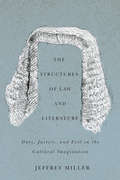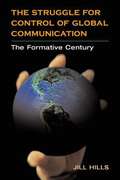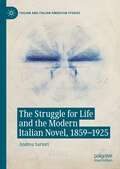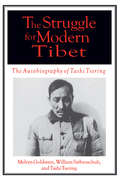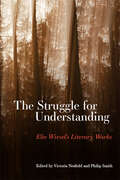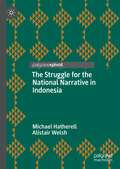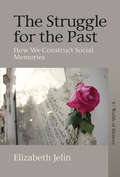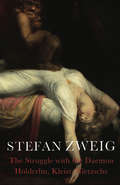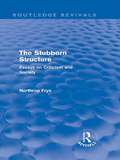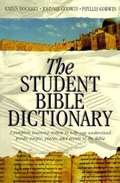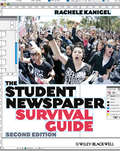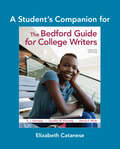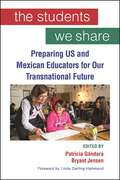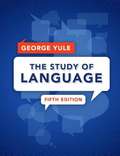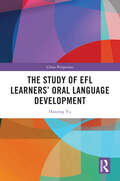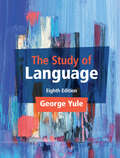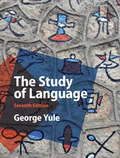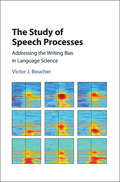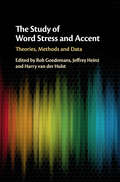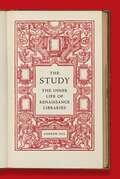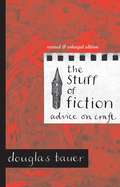- Table View
- List View
The Structures of Law and Literature
by Jeffrey MillerDo law and literature really have anything to say to each other? Until now, that threshold question has vexed law and literature studies. This revolutionary work provides a bold new answer, showing how law and literature spring from the same cultural impulses. Drawing on the archetypal criticism of Northrop Frye, the book takes a unique, quasi-scientific approach to the subject, covering both law in literature and law as literature. The Structures of Law and Literature moves beyond the works usually studied in the field (Charles Dickens, Franz Kafka, Herman Melville, Harper Lee) to consider traditional ballads, the biblical narratives of Moses and Job, literature from South Africa and France, as well as works in Yiddish and Hebrew, the poetry of W.B. Yeats, stories by John Updike, John Mortimer, and John Sayles, Scottish nationalist writing by James Kelman, the golem legend from the Talmud to modern novels, and more. It also investigates legalese as a dialect in a universe of its own making, provides a concise summary of the entire method proposed, and concludes with essays on selected works that render the method's application particularly graphic. Original and systematically argued, The Structures of Law and Literature is a provocative work that adds new dimensions to the cultural interplay of law and the humanities.
The Structures of Law and Literature: Duty, Justice, and Evil in the Cultural Imagination
by Jeffrey MillerDo law and literature really have anything to say to each other? Until now, that threshold question has vexed law and literature studies. This revolutionary work provides a bold new answer, showing how law and literature spring from the same cultural impulses. Drawing on the archetypal criticism of Northrop Frye, the book takes a unique, quasi-scientific approach to the subject, covering both law in literature and law as literature. The Structures of Law and Literature moves beyond the works usually studied in the field (Charles Dickens, Franz Kafka, Herman Melville, Harper Lee) to consider traditional ballads, the biblical narratives of Moses and Job, literature from South Africa and France, as well as works in Yiddish and Hebrew, the poetry of W.B. Yeats, stories by John Updike, John Mortimer, and John Sayles, Scottish nationalist writing by James Kelman, the golem legend from the Talmud to modern novels, and more. It also investigates legalese as a dialect in a universe of its own making, provides a concise summary of the entire method proposed, and concludes with essays on selected works that render the method's application particularly graphic. Original and systematically argued, The Structures of Law and Literature is a provocative work that adds new dimensions to the cultural interplay of law and the humanities.
The Struggle for Control of Global Communication: THE FORMATIVE CENTURY
by Jill HillsTracing the development of communication markets and the regulation of international communications from the 1840s through World War I, Jill Hills examines the political, technological, and economic forces at work during the formative century of global communication. The Struggle for Control of Global Communication analyzes power relations within the arena of global communications from the inception of the telegraph through the successive technologies of submarine telegraph cables, ship-to-shore wireless, broadcast radio, shortwave wireless, the telephone, and movies with sound. Global communication began to overtake transportation as an economic, political, and social force after the inception of the telegraph, which shifted communications from national to international. From that point on, says Hills, information was a commodity and ownership of the communications infrastructure became valuable as the means of distributing information. The struggle for control of that infrastructure occurred in part because the growing economic power of the United States was hindered by British control of communications. Hills outlines the technological advancements and regulations that allowed the United States to challenge British hegemony and enter the global communications market. She demonstrates that control of global communication was part of a complex web of relations between and within the government and corporations of Britain and the United States. Detailing the interplay between U.S. federal regulation and economic power, Hills shows how communication technologies have been shaped by these forces and fosters an understanding of contemporary systems of power in global communications.
The Struggle for Life and the Modern Italian Novel, 1859-1925 (Italian and Italian American Studies)
by Andrea SartoriThis book explores Darwinism in modern Italian literature. In the years between Italy’s unification (1861) and the rise of fascism, many writers gave voice to anxieties connected with the ideas of evolution and progress. This study shows how Italian authors borrowed and reworked a scientific vocabulary to write about the contradictions and the contrasting tensions of Italy’s cultural and political-economic modernization. It focuses, above all, on novels by Italo Svevo, Federico De Roberto and Luigi Pirandello. The analysis centers on such topics as the struggle against adverse social conditions in capitalistic society, the risk of failing to survive the struggle itself, the adaptive issues of individuals uprooted from their family and work environments, the concerns about the heredity of maladapted characters. Accordingly, the book also argues that the hybridization and variation of both narrative forms and collective mindsets describes the modernist awareness of the cultural complexity experienced in Italy and Europe at this time.
The Struggle for Modern Tibet: The Autobiography of Tashi Tsering (Mellen Studies In Education Ser. #Vol. 88)
by Melvyn C. Goldstein William R Siebenschuh Tashi TseringThis captivating autobiography by a Tibetan educator and former political prisoner is full of twists and turns. Born in 1929 in a Tibetan village, Tsering developed a strong dislike of his country's theocratic ruling elite. As a 13-year-old member of the Dalai Lama's personal dance troupe, he was frequently whipped or beaten by teachers for minor infractions. A heterosexual, he escaped by becoming a drombo, or homosexual passive partner and sex-toy, for a well-connected monk. After studying at the University of Washington, he returned to Chinese-occupied Tibet in 1964, convinced that Tibet could become a modernized society based on socialist, egalitarian principles only through cooperation with the Chinese. Denounced as a 'counterrevolutionary' during Mao's Cultural Revolution, he was arrested in 1967 and spent six years in prison or doing forced labor in China. Officially exonerated in 1978, Tsering became a professor of English at Tibet University in Lhasa. He now raises funds to build schools in Tibet's villages, emphasizing Tibetan language and culture.
The Struggle for Shakespeare's Text
by Gabriel EganWe know Shakespeare's writings only from imperfectly-made early editions, from which editors struggle to remove errors. The New Bibliography of the early twentieth century, refined with technological enhancements in the 1950s and 1960s, taught generations of editors how to make sense of the early editions of Shakespeare and use them to make modern editions. This book is the first complete history of the ideas that gave this movement its intellectual authority, and of the challenges to that authority that emerged in the 1980s and 1990s. Working chronologically, Egan traces the struggle to wring from the early editions evidence of precisely what Shakespeare wrote. The story of another struggle, between competing interpretations of the evidence from early editions, is told in detail and the consequences for editorial practice are comprehensively surveyed, allowing readers to discover just what is at stake when scholars argue about how to edit Shakespeare.
The Struggle for Understanding: Elie Wiesel's Literary Works (SUNY series in Contemporary Jewish Literature and Culture)
by Victoria Nesfield; Philip SmithElie Wiesel (1928–2016) was one of the most important literary voices to emerge from the Holocaust. The Nazis took the lives of most of his family, destroyed the community in which he was raised, and subjected him to ghettoization, imprisonment in Auschwitz and Buchenwald, and a death march. It is remarkable not only that Wiesel survived and found a way to write about his experiences, but that he did so with elegance and profundity. His novels grapple with questions of tradition, memory, trauma, madness, atrocity, and faith. The Struggle for Understanding examines Wiesel's literary, religious, and cultural roots and the indelible impact of the Holocaust on his storytelling. Grouped in sections on Hasidic origins, the role of the Other, theology and tradition, and later works, the chapters cover the entire span of Wiesel's career. Books analyzed include the novels Dawn, The Forgotten, The Gates of the Forest, The Town Beyond the Wall, The Testament, The Time of the Uprooted, The Sonderberg Case, and Hostage, as well as his memoir, Night. What emerges is a portrait of Wiesel's work in its full literary richness.
The Struggle for the National Narrative in Indonesia
by Michael Hatherell Alistair WelshThis book offers a unique analysis of how political representatives construct ideas about the nation in contemporary Indonesian politics. In their struggle to define what the authors call the ‘national narrative’, would-be national leaders seek to develop a story about the nation’s past, present and future. These stories feature a unique plot, set of characters, and a moral that the political narrator hopes will resonate. In contemporary Indonesia, the authors assess two prominent national narratives: the technocratic and populist national narratives. The book concludes with an analysis that considers other potential sources of ideas about the nation, as well as the potential implications for domestic politics and Indonesian grand strategy.
The Struggle for the Past: How We Construct Social Memories (Worlds of Memory #6)
by Elizabeth JelinIn all societies—but especially those that have endured political violence—the past is a shifting and contested terrain, never fixed and always intertwined with present-day cultural and political circumstances. Organized around the Argentine experience since the 1970s within the broader context of the Southern Cone and international developments, The Struggle for the Past undertakes an innovative exploration of memory’s dynamic social character. In addition to its analysis of how human rights movements have inflected public memory and democratization, it gives an illuminating account of the emergence and development of Memory Studies as a field of inquiry, lucidly recounting the author’s own intellectual and personal journey during these decades.
The Struggle with the Daemon
by Eden Paul Cedar Paul Stefan ZweigThe Struggle with the Daemon is a brilliant analysis of the European psyche by the great novelist and biographer Stefan Zweig. Zweig studies three giants of German literature and thought: Friedrich Ho¨lderlin, Heinrich von Kleist and Friedrich Nietzsche - powerful minds whose ideas were at odds with the scientific positivism of their age; troubled spirits whose intoxicating passions drove them mad but inspired them to great works. In their struggle with their inner creative force, Zweig reflects the conflict at the heart of the European soul - between science and art, reason and inspiration.Both highly personal and philosophically wide-ranging, this is one of the most fascinating of Zweig's renowned biographical studies.From the Trade Paperback edition.
The Stubborn Structure: Essays on Criticism and Society (Routledge Revivals)
by Northrop FryeFirst published in 1970, this collection is made up of a selection of essays composed between 1962 and 1968, written by distinguished humanist and literary critic Northrop Frye. The book is divided into two parts: one deals largely with the contexts of literary criticism; the other offers more specific studies of literary works in roughly historical sequence. One of the essays is Frye’s own elucidation of the development of his critical premises out of his early concern with the poetry of William Blake. Taken together, the essays offer a continuous and coherent argument, making a whole that is entirely equal to the sum of its parts.
The Student Bible Dictionary: A Complete Learning System to Help You Understand Words, People, Places, and Events of the Bible
by Karen Dockrey Johnnie Godwin Phyllis GodwinHere's a concise, easy-to-use reference book for students of all ages who seek to learn more about the Bible and its times. The Student Bible Dictionary features definitions and explanations of hundreds of Bible words, names, places, and concepts. Special color coding, meanwhile, adds special emphasis to important topics which feature additional information geared toward the student reader. From AARON to ZIPPORAH, the Student Bible Dictionary is a whole library of accessible, useful information!
The Student Newspaper Survival Guide
by Rachele KanigelThe Student Newspaper Survival Guide has been extensively updated to cover recent developments in online publishing, social media, mobile journalism, and multimedia storytelling; at the same time, it continues to serve as an essential reference on all aspects of producing a student publication. Updated and expanded to discuss many of the changes in the field of journalism and in college newspapers, with two new chapters to enhance the focus on online journalism and technology Emphasis on Web-first publishing and covering breaking news as it happens, including a new section on mobile journalism Guides student journalists through the intricate, multi-step process of producing a student newspaper including the challenges of reporting, writing, editing, designing, and publishing campus newspapers and websites Chapters include discussion questions, exercises, sample projects, checklists, tips from professionals, sample forms, story ideas, and scenarios for discussion Fresh, new, full color examples from award winning college newspapers around North America Essential reading for student reporters, editors, page designers, photographers, webmasters, and advertising sales representatives
The Student's Companion for The Bedford Guide for College Writers
by Dorothy Kennedy X. Kennedy Marcia MuthDesigned to support students learning to navigate college and first-year composition at the same time, A Student’s Companion for The Bedford Guide for College Writers provides: •College success materials that help students build confidence, manage time effectively, and write ethically and responsibly Activities designed to help students develop, draft, and revise thoughtful, college-level writing projects for each of the writing goals in Part Two of The Bedford Guide for College Writers Sentence guides for academic writing that give students a jumping-off point as they learn to present and respond to the ideas of others Extra practice with developing topic sentences, avoiding wordiness, and correcting other common problems, such as comma splices and fragments Introduction
The Students We Share: Preparing US and Mexican Educators for Our Transnational Future
by Patricia Gándara; Bryant JensenMillions of students in the US and Mexico begin their educations in one country and find themselves trying to integrate into the school system of the other. As global migration increases, their numbers are expected to grow and more and more teachers will find these transnational students in their classrooms. The goal of The Students We Share is to prepare educators for this present and future reality. While the US has been developing English as a Second Language programs for decades, Mexican schools do not offer such programs in Spanish and neither the US nor Mexico has prepared its teachers to address the educational, social-psychological, or other personal needs of transnational students. Teachers know little about the circumstances of transnational students' lives or histories and have little to no knowledge of the school systems of the country from which they or their family come. As such, they are fundamentally unprepared to equitably educate the "students we share," who often fall through the cracks and end their educations prematurely. Written by both Mexican and US pioneers in the field, chapters in this volume aim to prepare educators on both sides of the US-Mexico border to better understand the circumstances, strengths, and needs of the transnational students we teach. With recommendations for policymakers, administrators, teacher educators, teachers, and researchers in both countries, The Students We Share shows how preparing teachers is our shared responsibility and opportunity. It describes policies, classroom practices, and norms of both systems, as well as examples of ongoing partnerships across borders to prepare the teachers we need for our shared students to thrive.
The Study Of Language, 5th ed.
by George YuleThis bestselling textbook provides an engaging and user-friendly introduction to the study of language. Assuming no prior knowledge of the subject, Yule presents information in bite-sized sections, clearly explaining the major concepts in linguistics - from how children learn language to why men and women speak differently, through all the key elements of language. <P> This fifth edition has been revised and updated with new figures and tables, additional topics, and numerous new examples using languages from across the world. To increase student engagement and to foster problem-solving and critical thinking skills, the book includes thirty new tasks. An expanded and revised online study guide provides students with further resources, including answers and tutorials for all tasks, while encouraging lively and proactive learning. This is the most fundamental and easy-to-use introduction to the study of language.
The Study of EFL Learners’ Oral Language Development (China Perspectives)
by Hanjing YuThe book provides a systematic investigation of the dynamic trajectories in the oral language development of English as a foreign language (EFL) learners, integrating both inter-individual variation and intra-individual variability. It also identifies unobserved heterogeneity in oral language production.Using longitudinal designs, comprehensive developmental data collection, and innovative analytic techniques, the study reveals distinct developmental trajectories in the oral language systems of EFL learners. It also examines the interactions among complexity, accuracy, and fluency (CAF), exploring the potential of complex dynamic systems theory (CDST)-inspired approaches to studying oral language development and their implications for teaching oral language to Chinese learners. In addition, by employing the novel growth mixture model (GMM) method, the study identifies salient developmental patterns of CAF within a larger population, thereby contributing to the generalizability of findings from CDST-based language development research.This book will be valuable to students, researchers, and educational practitioners interested in oral language development and complex dynamic systems theory.
The Study of Language
by George YuleThis bestselling textbook provides an engaging and user-friendly introduction to the study of language. Assuming no prior knowledge of the subject, Yule presents information in bite-sized sections, clearly explaining the major concepts in linguistics and all the key elements of language. This eighth edition has been revised and updated throughout, with major changes in the chapters on Origins, Phonetics, Syntax, Semantics, Pragmatics, Discourse Analysis, First and Second Language Acquisition and Culture. There are forty new study questions and over sixty new and updated additions to the Further Readings. To increase student engagement and to foster problem-solving and critical thinking skills, the book includes over twenty new tasks. The online resources have been expanded to include test banks, an instructor manual, and a substantial Study Guide. This is the most fundamental and easy-to-use introduction to the study of language.
The Study of Language (6th Edition)
by George YuleLinguist Yule takes on the questions of the first-time student, covering the origins of language, animals and human language, the development of writing, the sounds and sound patterns of language, words and word formation, morphology, grammar in phrases and sentences, syntax, semantics, pragmatics, discourse analysis, language and the brain, first and second language acquisition, body language, language history and change, regional variation and language within culture. Yule has completely updated this undergraduate text and added new sections on language and culture, African American vernacular English, corpus linguistics, gender, gestures, slang, social markets, and speech accommodation. He has also provided new exercises and study questions and a new glossary. Annotation ©2006 Book News, Inc. , Portland, OR (booknews. com)
The Study of Language: An Introduction
by George YuleThis bestselling textbook provides an engaging and user-friendly introduction to the study of language. Assuming no prior knowledge of the subject, Yule presents information in bite-sized sections, clearly explaining the major concepts in linguistics and all the key elements of language. This seventh edition has been revised and updated throughout, with substantial changes to the chapters on phonetics and semantics, and forty new study questions. To increase student engagement and to foster problem-solving and critical thinking skills, the book includes over twenty new tasks. An expanded and revised online study guide provides students with further resources, including answers and tutorials for all tasks, while encouraging lively and proactive learning. This is the most fundamental and easy-to-use introduction to the study of language.
The Study of Speech Processes: Addressing the Writing Bias in Language Science
by Victor J. BoucherThere has been a longstanding bias in the study of spoken language towards using writing to analyse speech. This approach is problematic in that it assumes language to be derived from an autonomous mental capacity to assemble words into sentences, while failing to acknowledge culture-specific ideas linked to writing. Words and sentences are writing constructs that hardly capture the sound-making actions involved in spoken language. This book brings to light research that has long revealed structures present in all languages but which do not match the writing-induced concepts of traditional linguistic analysis. It demonstrates that language processes are not physiologically autonomous, and that speech structures are structures of spoken language. It then illustrates how speech acts can be studied using instrumental records, and how multisensory experiences in semantic memory couple to these acts, offering a biologically-grounded understanding of how spoken language conveys meaning and why it develops only in humans.
The Study of Word Stress and Accent: Theories, Methods and Data
by Harry van der Hulst Jeffrey Heinz Rob GoedemansStress and accent are central, organizing features of grammar, but their precise nature continues to be a source of mystery and wonder. These issues come to the forefront in the phonetic manifestation of stress and accent, their cross-linguistic variation and the subtle and intricate laws they obey in individual languages. Understanding the nature of stress and accent systems informs all aspects of linguistic theory, methods, typology and especially the grammatical analysis of language data. These themes form the organizational backbone of this book. Bringing together a team of world-renowned phonologists, the volume covers a range of typological and theoretical issues in the study of stress and accent. It will appeal to researchers who value synergistic approaches to the study of stress and accent, careful attention to cross-linguistic variation, and detailed analyzes of both well-studied and understudied languages. The book is a lively testimony of a field of inquiry that shows progress, while also identifying questions for ongoing research.
The Study of Words: An Introduction (Routledge Guides to Linguistics)
by Lewis GebhardtThe Study of Words introduces the study of word structure, also known as morphology, without assuming any prior knowledge of linguistics. Introducing concepts in an accessible way, Gebhardt illustrates how to understand and produce both existing and new words. This book: • Provides an overview of words, word components and the rules by which components can and cannot be assembled into words; • Introduces the area of morphology with a data-driven approach, exposing readers to sets of words in a variety of languages and prompting them to identify their components and seek patterns; • Features exercises and questions throughout to provoke thought and point readers to unresolved morphological issues. Aimed at students at undergraduate level with no background in linguistics, The Study of Words is essential reading for those studying morphology for the first time as part of linguistics, language and general education courses.
The Study: The Inner Life of Renaissance Libraries
by Andrew HuiA uniquely personal account of the life and enduring legacy of the Renaissance libraryWith the advent of print in the fifteenth century, Europe&’s cultural elite assembled personal libraries as refuges from persecutions and pandemics. Andrew Hui tells the remarkable story of the Renaissance studiolo—a &“little studio&”—and reveals how these spaces dedicated to self-cultivation became both a remedy and a poison for the soul.Blending fresh, insightful readings of literary and visual works with engaging accounts of his life as an insatiable bookworm, Hui traces how humanists from Petrarch to Machiavelli to Montaigne created their own intimate studies. He looks at imaginary libraries in Rabelais, Cervantes, Shakespeare, and Marlowe, and discusses how Renaissance painters depicted the Virgin Mary and St. Jerome as saintly bibliophiles. Yet writers of the period also saw a dark side to solitary reading. It drove Don Quixote to madness, Prospero to exile, and Faustus to perdition. Hui draws parallels with our own age of information surplus and charts the studiolo&’s influence on bibliographic fabulists like Jorge Luis Borges and Umberto Eco.Beautifully illustrated, The Study is at once a celebration of bibliophilia and a critique of bibliomania. Incorporating perspectives on Islamic, Mughal, and Chinese book cultures, it offers a timely and eloquent meditation on the ways we read and misread today.
The Stuff of Fiction: Advice on Craft
by Douglas BauerIn this book, prizewinning novelist and popular creative writing instructor Douglas Bauer (The Book of Famous Iowans) shares the secrets of his trade. Talent, as Bauer acknowledges, is the most crucial element for a writer and cannot be taught. But without a regular habit of work, and a perseverance of effort, no amount of talent can come forward and be recognized. His lively and candid essays on subjects critical to the fiction writer's success demystify the essential elements of fiction writing, how they work, and work together. Bauer's focus is on the building blocks of successful fiction: dialogue (the intimate relationship between characters talking and the eavesdropping reader), characters (the virtues of creating fictional characters that are both splendidly flawed and sympathetic), and dramatic events (ways to create moments that produce an emotional and psychological impact). There are also chapters on crafting effective openings and memorable closings of stories and on the vital presence of sentiment in fiction versus the ruinous effect of sentimentality. By assuming the point of view of someone at the task, engaged with the work, inside the effort to bring an invented world to life,The Stuff of Fictionspeaks to writers of all ages in a pleasurable yet practical voice. Douglas Baueris the author of three novels,Dexterity,The Very Air, andThe Book of Famous Iowans, and one book of nonfiction,Prairie City, Iowa. He is also a core faculty member with the MFA Program at Bennington College and has received a National Endowment for the Arts grant, a Massachusetts Artists Foundation grant, and two Harvard Danforth Excellence in Teaching Citations.
